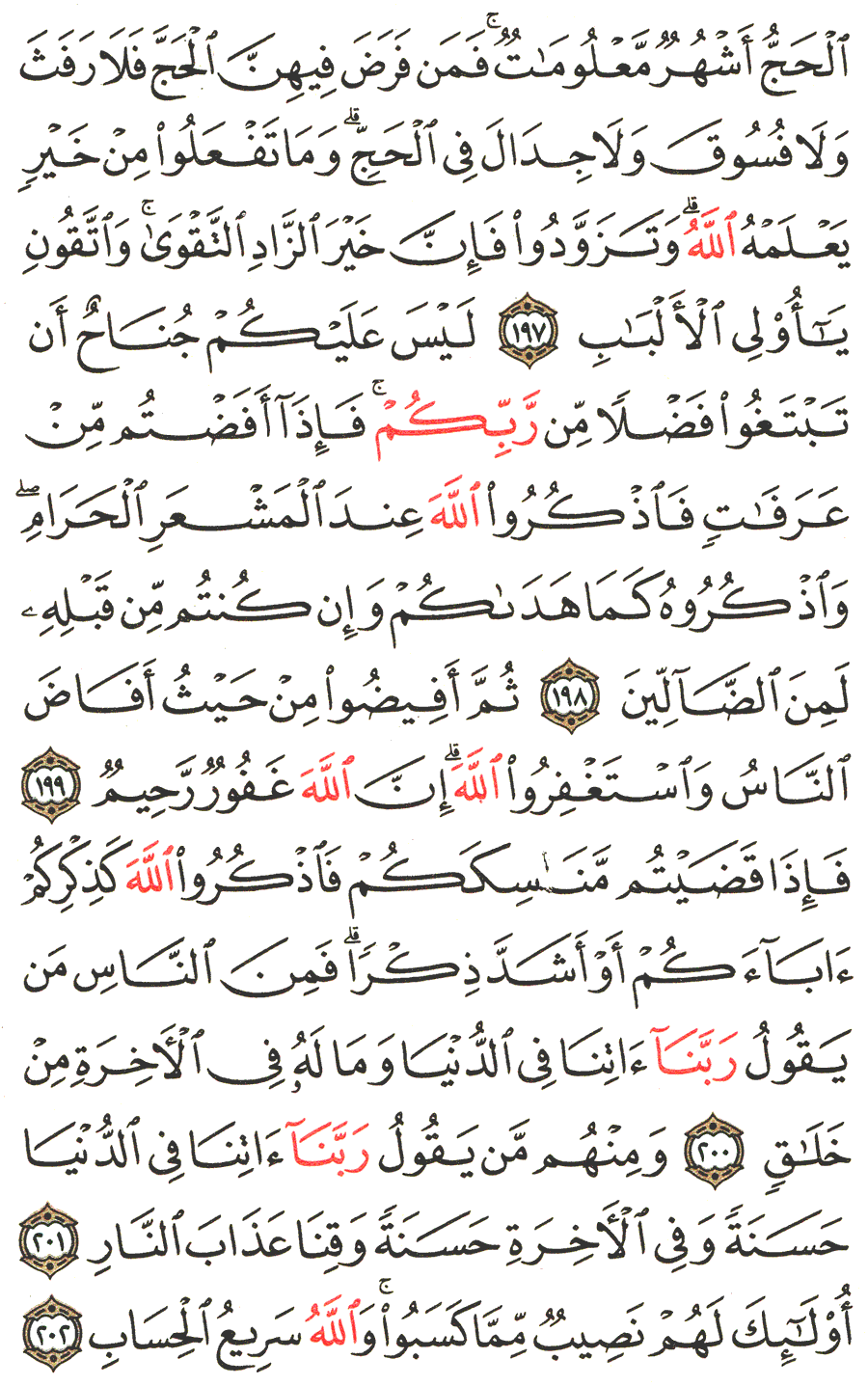Surah Al-Baqarah - سورة البقرة | reading sorat bakara Written in Arabic language with translating meanings English & from the moshaf in arabic uthmani
| Listen mp3 | Tafsir Arabic | tafsir mokhtasar |
| English | Indonesian | French |
| German | Hausa | Spanish |

English translation of the meaning Page No 31
Sura Al-Baqarah from 197 to 202
197. The Hajj ( pilgrimage ) is ( in ) the well- known ( lunar year ) months ( i.e. the 10th month, the 11th month and the first ten days of the 12th month of the Islâmic calendar, i.e. two months and ten days ) . So whosoever intends to perform Hajj [ 1 ] therein ( by assuming Ihrâm ) , then he should not have sexual relations ( with his wife ) , nor commit sin, nor dispute unjustly during the Hajj. And whatever good you do, ( be sure ) Allâh knows it. And take a provision ( with you ) for the journey, but the best provision is At- Taqwa ( piety, righteousness ) . So fear Me, O men of understanding!
198. There is no sin on you if you seek the Bounty of your Lord ( during pilgrimage by trading ) . Then when you leave ‘Arafât [ 2 ] , remember Allâh ( by glorifying His Praises, i.e. prayers and invocations ) at the Mash‘ar- il- Harâm [ 3 ] . And remember Him ( by invoking Allâh for all good. ) as He has guided you, and verily, you were, before, of those who were astray.
199. Then depart from the place whence all the people depart and ask Allâh for His Forgiveness. Truly, Allâh is Oft- Forgiving, Most- Merciful.
200. So when you have accomplished your Manâsik [ 4 ] , remember Allâh as you remember your forefathers or with a far more remembrance. But of mankind there are some who say: « Our Lord! Give us ( Your Bounties ) in this world! » and for such there will be no portion in the Hereafter.
201. And of them there are some who say: « Our Lord! Give us in this world that which is good and in the Hereafter that which is good, and save us from the torment of the Fire! »
202. For them there will be allotted a share for what they have earned. And Allâh is Swift at reckoning.
[1] (V.2:197) What is said regarding Hajj At-Tamattu‘, Hajj Al-Qirân, and Haij Al-Ifrâd. And whoever has not brought a Hady with him, he should finish the Ihrâm of Hajj, and make it as ‘Umrah, (and then assume another Ihrâm for Hajj from Makkah, etc.) There are three ways of performing Hajj - as follows:
a ) Hajj At- Tamattu‘: It means that you have no Hady with you and you assume Ihrâm only for ‘Umrah first and after ‘Umrah you finish your Ihrâm and assume another Ihrâm for performing Hajj, from Makkah, but you have to slaughter a Hady.
b ) Hajj Al- Qirân: It means that one should have a Hady with him and should perform ‘Umrah and then Hajj with the same state of Ihrâm .
c ) Hajj AI- Ifrâd: It means that one assumes Ihrâm with the intention of performing Hajj only and does not perform ‘Umrah.
[2] (V.2:198) ‘Arafât: a well known place near Makkah where pilgrims have to spend the 9th day of Dhul-Hijjah.
[3] (V.2:198) Al-Mash‘ar Al-Harâm, i.e. Muzdalifah a well-known place near Makkah, where pilgrims have to stop and stay for the whole night of the 10th of Dhul-Hijjah , or a great part of it.
[4] (V.2:200) "Manâsik" i.e. Ihrâm, Tawâf of the Ka‘bah and As-Safâ and Al-Marwah, stay at ‘Arafât, Muzdalifah and Mina, Ramy of Jamarât, (stoning of the specified pillars in Mina) slaughtering of Hady (animal).










Page No 31 Download and Listen mp3